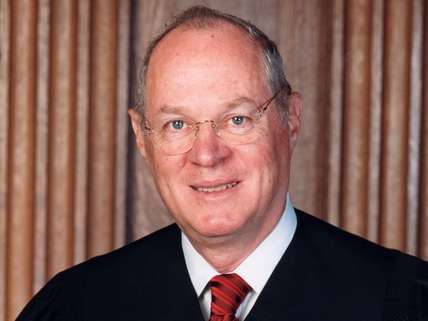Justice Anthony Kennedy Is Retiring and All Hell Is About to Break Loose
It's the end of an era at the U.S. Supreme Court.

It's the end of an era at the U.S. Supreme Court. Today Justice Anthony Kennedy announced his retirement.
In a letter sent this afternoon to President Donald Trump, Kennedy announced that "effective July 31 of this year," he will "end his regular active status as an Associate Justice of the Supreme Court." "Please permit me by this letter," Kennedy wrote, "to express my profound gratitude for having had the privilege to seek in each case how best to know, interpret, and defend the Constitution and the laws that must always conform to its mandates and promises."
Appointed to the Supreme Court in 1987 by President Ronald Reagan, Kennedy's impact on American law and politics is almost beyond reckoning. From the battles over gay rights, abortion, and affirmative action, to the clashes over gun control, campaign finance, and health care reform, Kennedy's fingerprints are everywhere. He is perhaps the single most influential jurist alive today and he will surely go down in American legal history as one of the most influential justices to serve on the high court.
Perhaps his most notable contribution came in the area of gay rights. Kennedy is and will remain a hero to many for his authorship of all four of the Supreme Court's great decisions affirming the fundamental rights of gay people. In Romer v. Evans (1996), Kennedy led the Court in overturning a Colorado constitutional amendment that barred state officials from taking any action designed to protect gays from discrimination. In Lawrence v. Texas (2003), Kennedy led the Court in overturning that state's ban on "homosexual conduct." In United States v. Windsor (2013), Kennedy led the Court in invalidating a central part of the Defense of Marriage Act. Finally, in Obergefell v. Hodges (2015), he led the Court in recognizing a constitutional right to gay marriage.
On the hot button issue of abortion, Kennedy managed to alternately hearten and dispirit both sides of the debate. In Planned Parenthood v. Casey (1992), Kennedy joined the plurality opinion which is widely credited with saving Roe v. Wade from being overturned. Casey reaffirmed that abortion is a fundamental right and held that state regulations many not "impose an undue burden on the right." Yet in Gonzales v. Carhart (2007), Kennedy wrote the majority opinion upholding the 2003 Partial-Birth Abortion Ban Act signed by President George W. Bush. More recently, Kennedy joined Justice Stephen Breyer's opinion in Whole Woman's Health v. Hellerstedt (2016), which held that Texas exceeded its lawful regulatory power when it imposed certain onerous health and safety restrictions on abortion clinics and providers.
As a moderate conservative with liberal tendencies, Kennedy often found himself casting the tie-breaking vote in such closely divided cases. That gave him tremendous influence over the direction of American law.
That influence came with a certain price. Over the years, Kennedy has been denounced by every major faction in American politics. In conservative circles, for example, he has been keelhauled as a reckless judicial activist who "invented" a right to gay marriage. Liberals, meanwhile, have burned him in effigy as the unwitting mouthpiece for corporate oligarchs thanks to his majority opinion in the Citizens United case. And among libertarians, Kennedy has been damned as the fair-weather federalist who torpedoed the rights of local medical marijuana users in favor of a federal drug control scheme. Libertarians will also point out that Kennedy joined the majority opinion that unleashed the forces of eminent domain abuse in Kelo v. City of New London (2005).
To say the least, Kennedy's jurisprudence defies easy categorization. Legal scholars will be arguing about it for a long time to come.
Kennedy's retirement comes at a loaded moment in American politics. As things stand now, Senate Republicans have the votes—but just barely—to approve whatever nominee President Trump puts forward as a replacement. But what if the Republican ranks don't hold?
And then of course there are the Democrats, who will undoubtedly mount a massive political attack on whatever nominee Trump puts forward.
In short, thanks to Kennedy's retirement, all hell is about to break loose.
